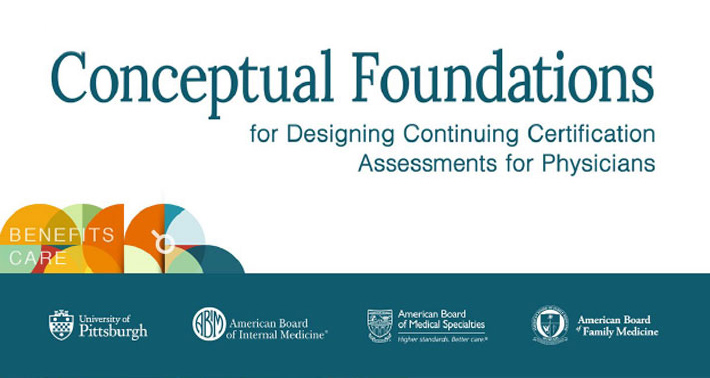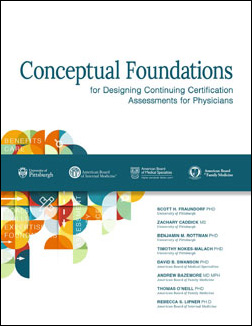
As certifying boards continue to evolve their certification programs to focus on more frequent, learner-engaged assessments, a recently published comprehensive report synthesizes findings from over 600 studies to describe the foundational evidence behind the need for continuous certification.
The American Board of Medical Specialties (ABMS) partnered with the American Board of Internal Medicine, the American Board of Family Medicine, and faculty from the University of Pittsburgh Department of Psychology to synthesize the evidence that supports the need for the continuing assessment of physicians’ clinical knowledge.
The whitepaper, “Conceptual Foundations for Designing Continuing Certification Assessments for Physicians,” reveals four central themes and supports the move to a model of longitudinal assessment.
- Cognitive Skills Need to Be Kept Current
Family physicians often ask why they need board certification, and why it’s necessary to take an exam instead of self-monitoring. The evidence is clear that with the explosion of new clinical knowledge and approaches to care and the natural decline in cognitive skills that occur over time, constant vigilance with lifelong learning is necessary for physicians to remain current and to provide the highest quality of evidence-based care. - Individual Self-Assessment Is Not Enough
Abundant evidence confirms that physicians often don’t know what they don’t know, and that they overestimate retention of information learned. This forms the basis for the need for more structured and formalized ways for physicians to identify their knowledge gaps in order to plan CME and other forms of self-study that include appropriate attention to closing knowledge gaps. This is where ABFM self-assessment activities, such as KSAs, CKSAs, and the National Journal Club come into the equation as providing that mechanism for knowledge assessment and targeted ways to address knowledge deficits. - Testing Enhances Learning and Retention
While not often popular, testing has been well demonstrated to be a powerful device for learning and retaining cognitive knowledge. Not always appreciated is the fact that testing also supports application of complex problem solving, as well as enhances the practice of retrieval from memory. These outcomes are boosted by having tests spaced over time. Across all adult learning, longitudinal assessment has been shown to result in greater retention of knowledge as compared to the rote memorization that often precedes one-day examinations spaced 10 years apart. ABFM’s new longitudinal assessment alternative to the one-day exam also supports “learning while testing.” - Goals and Consequences Motivate
Finally, research has found that physicians learn and retain more when they know they will be tested. The expectation that physicians will be required to periodically demonstrate their cognitive expertise over the course of their career increases their motivation to study and update their knowledge competency over time.
Download the full research report[PDF]
-
Read More:
- Continuing Certification |
- Reports |

